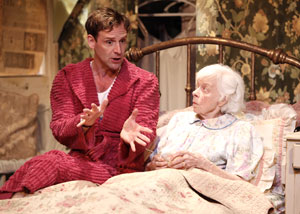SITE GUIDE
SEARCH
REVIEWS
REVIEW ARCHIVES
ADVERTISING AT CURTAINUP
FEATURES
NEWS
Etcetera and
Short Term Listings
LISTINGS
Broadway
Off-Broadway
NYC Restaurants
BOOKS and CDs
OTHER PLACES
Berkshires
London
California
New Jersey
DC
Connecticut
Philadelphia
Elsewhere
QUOTES
TKTS
PLAYWRIGHTS' ALBUMS
LETTERS TO EDITOR
FILM
LINKS
MISCELLANEOUS
Free Updates
Masthead
A CurtainUp Review
Vigil
|
I mean, I'll miss you terribly—but I'll manage. I just wanted to make that clear. I don't want you to do anything just to please me. — Kemp.—
|

Malcolm Gets and Helen Stenborg in Vigil.
|
This play, formerly named Auntie and Me, was a hit at the Edinburgh Fringe Festival back in 2002 and had a later run in London's West End. Curtainup also caught up with it during a brief run in the Berkshires. Now New Yorkers can see it at the DR2 Theaer.
This is no sentimental story of a loving nephew with his dying aunt but a new take on the idea that the world is filled with lonelyhearts, with Kemp (Malcolm Gets) study of a man who's essentially forgotten how to connect with other human beings.
The acting in this two-hander is first-rate. Malcolm Gets, who has numerous musical credits on and off Broadway (Amour), really grabs hold of his character. And Helen Stenborg, as the dying aunt, reminds us that spoken words are not the only means to effectively convey a character on stage. She barely speaks during most of the play.
Gets' character can be off-putting, with his calculating attitude towards his aunt (he seems more interested in his inheritance than in her fragile health or emotional well-being), but he wins us over with his spot-on acting. We get to know Kemp not only via his richly-nuanced voice but through the subtle lifting of an eyebrow or shift in posture. Stenborg, as the aunt who's not long for this world is the epitome of vulnerability. But she also displays an indomitable spirit and will ultimately teach Kemp a thing or two about life and that darker subject, death and dying.
The production would benefit if the intermission was cut along with a few scenes. Director Stephen DiMenna would have done well to rethink having so many short scenes back-to back, all punctuated by blackouts. Instead of building the action, these staccato-like episodes create a fragmenting effect. Another reason for omitting some scenes is that Kemp is not that psychologically complex a character. Granted, he does change from being a killer-diller to a more feeling human being but it seems unnecessary to watch him find a dozen new ways to hurry his aunt to her grave. .
The original music by Greg Pliska is a plus for heightening pivotal moments and accentuating Stenborg's sustained silence and Gets' zanyness. The passing of the seasons is sensitively rendered by Ed McCarthy's lighting; and Andromache Chalfant's claustrophobic set is rightly cluttered with an old woman's life-time paraphernalia.The show is worth seeing for the excellent performances by these strange bedfellows who execute a fine pas de deux before the final scene with its surprise twist.
|
Vigil Written by Morris Panych Directed by Stephen DiMenna Cast: Malcolm Gets (Kemp), Helen Stenborg (Grace). Sets: Andromache Chalfant Costumes: Ilona Somogyi Original Music and Sound: Greg Pliska Lighting: Ed McCarthy Stage Manager: Angela Allen At DR2 Theatre, 103 East 15th Street. Tickets are $65, phone (212) 239-6200 or visit www.telecharge.com From 9/20/09; opening 9/29/09; closing 11/29/09. Wednesday at 2pm and 8pm; Thursday and Friday at 8pm; Saturday at 3pm and 8pm; and Sunday at 3pm and 7pm. Running time: 1 hour 30 minutes plus a 10 minute intermission. Reviewed by Deirdre Donovan based on October 2nd press performance. |
|
Subscribe to our FREE email updates with a note from editor Elyse Sommer about additions to the website -- with main page hot links to the latest features posted at our numerous locations. To subscribe,
E-mail: esommer@curtainup.comesommer@curtainup.com
put SUBSCRIBE CURTAINUP EMAIL UPDATE in the subject line and your full name and email address in the body of the message -- if you can spare a minute, tell us how you came to CurtainUp and from what part of the country. |
|
REVIEW FEEDBACK Highlight one of the responses below and click "copy" or"CTRL+C"
Paste the highlighted text into the subject line (CTRL+ V): Feel free to add detailed comments in the body of the email. . .also the names and emails of any friends to whom you'd like us to forward a copy of this review. |






